The hearing now goes into recess as House lawmakers head to the floor for votes.
Rep. Jim Jordan (R-Ohio) questioned Mr. Hur if there was any reason that Congress should not receive access to the audio recordings the Special Prosecutor used in formulating his report.
The Ohio Republican noted on multiple occasions that the transcripts from the special counsel’s investigation were only released on the morning of the hearing.
“Mr. Herr, are you opposed to the U.S. Congress having access to the audio tapes of the people you interviewed during your investigation?” Mr. Jordan asked.
Rep. Veronica Escobar (D-Texas) asked rhetorical questions to Mr. Hur as she painted a “stark contrast” between President Trump and President Biden’s alleged mishandling of classified information.
In response to these questions, Mr. Hur said he was not aware of thousands of people accessing Biden’s residence whereas there are that many people at President Trump’s Mar-a-Lago estate.
Whereas Mar-a-Lago—where classified materials were confiscated during an FBI raid in August 2022—is accessible to tens of thousands of people, President Biden’s home was not accessible to that many people and therefore the chances of exposure to those without permission to classified information at the latter location was significantly lower than at the former.
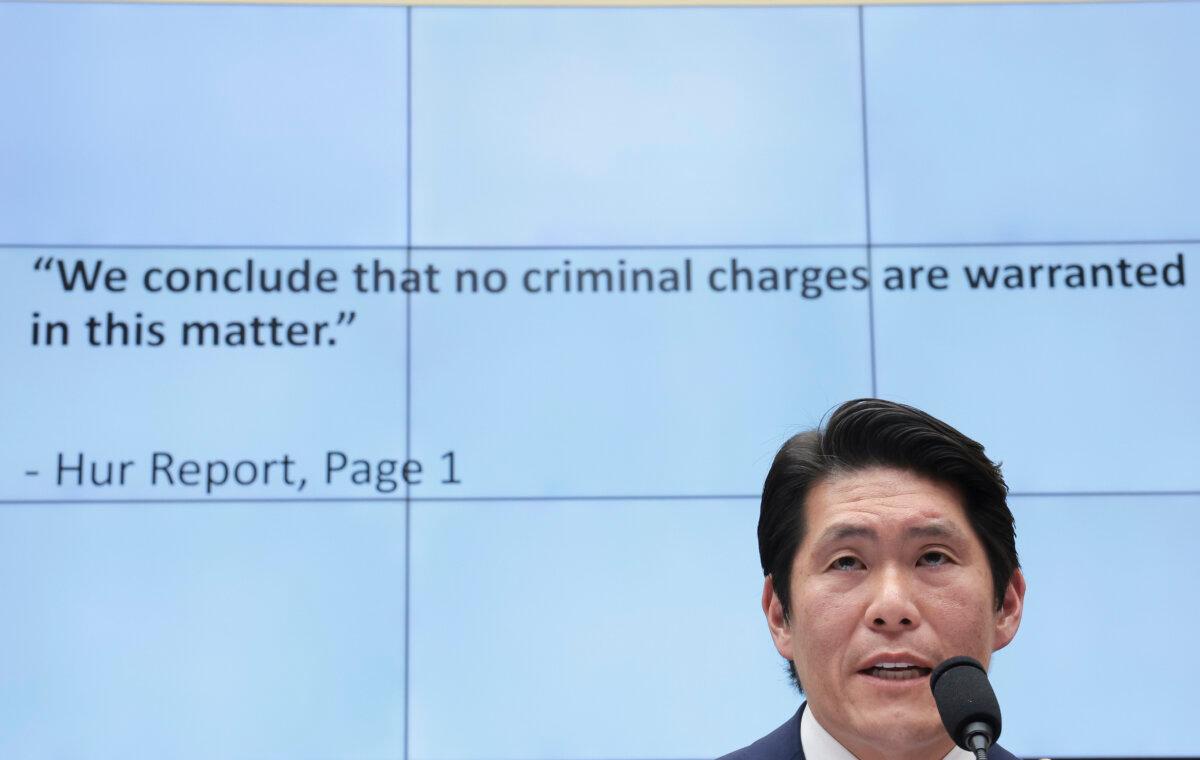
Rep. Hageman Questions Differences in Classified Document Standards Between Trump, Biden, and Hillary Clinton
Rep. Hageman (R-Wyo.) questioned the alleged prosecutorial inconsistency between former President Donald Trump and other politicians.
The lawmaker questioned Mr. Hur, saying, “Can you please explain why those people without the last name of Clinton or Biden are typically treated quite differently and seem to be the only ones who are never held accountable for violating the law?”
Mr. Hur responded, saying, “Congresswoman, one of the things that I explained in my report is the fact that there are historical precedents with respect to former occupants of the White House and their retention of classified materials after they leave.”
After Rep. Barry Moore (R-Ala.) confirmed his belief that Mr. Hur had a reputation that was “beyond reproach,” the lawmaker asserted that another special counsel, Jack Smith, was less reliable.
“You have a special counsel colleague by the name of Jack Smith, who cannot lay claim to such a reputation. Isn’t that right?” Mr. Moore said.
Mr. Hur responded, saying, “I have no opinion.”
Mr. Hur, contrary to House Judiciary Chairman Jerry Nadler (D-N.Y.), said the report is not a total and complete exoneration of President Biden.
In his report, Mr. Hur said President Biden mishandled classified information, but that there was not enough to successfully prosecute a criminal case.
The word “exoneration” is not in the report, Mr. Hur noted.
Rep. Joe Neguse (D-Colo.) noted there was a difference between the 2019 release of the Mueller report—which said President Trump’s 2016 campaign did not collude and that a conclusion could not be reached on whether there was obstruction—and the Hur report that stated President Biden mishandled classified information but that there was no legal case that could be pursued against him.
With the Mueller report, Attorney General William Barr chimed in and gave what Mr. Neguse said was incorrect, while Attorney General Merrick Garland did not give his two cents on Mr. Hur’s report.
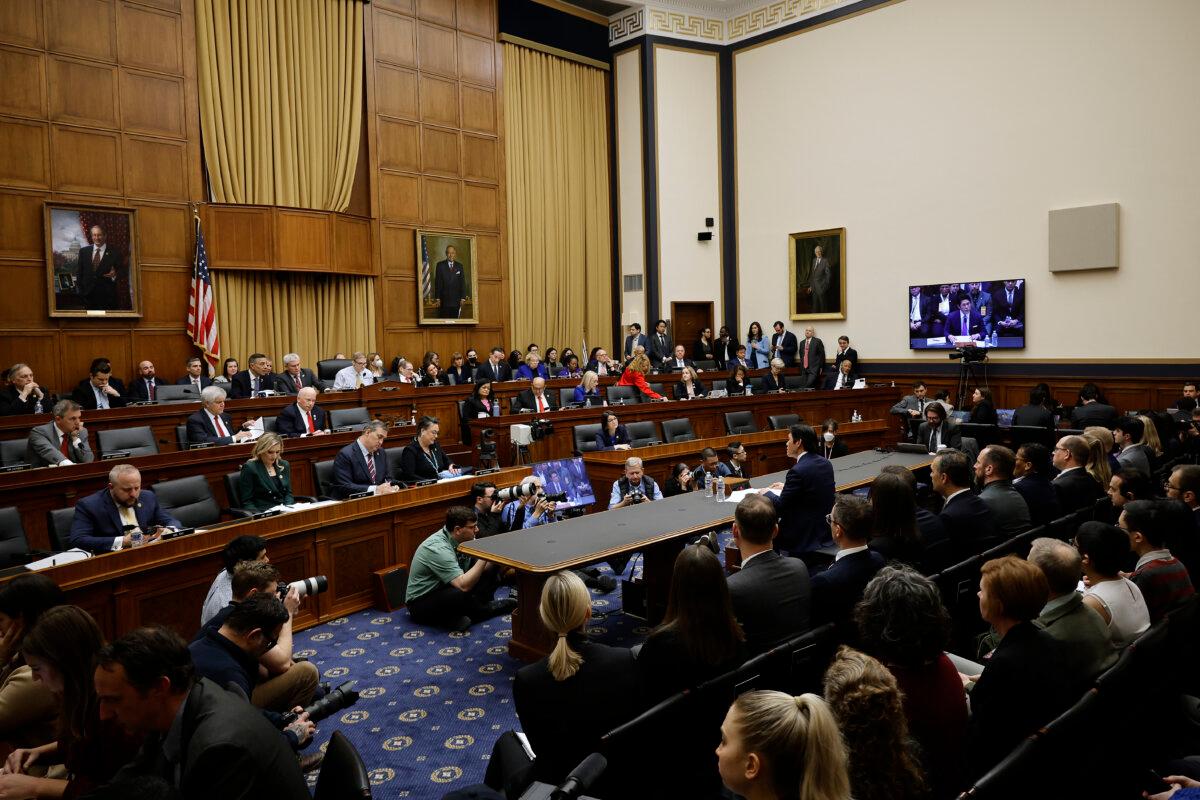
Under questioning from Rep. Joe Neguse (R-Co.), Mr. Hur confirmed that Attorney General Merrick Garland did not interfere with his report in any way.
“During your 15-month investigation, did the Attorney General attempt to interfere with your investigation?” Mr. Neguse queried.
Mr. Hur responded, “No.”
Rep. Marry Gay Scanlon (D-Pa.) came to President Biden’s defense over him, according to Mr. Hur’s report, frequently forgetting. In doing so, she played a video of former President Donald Trump being deposed during a lawsuit over the now-defunct Trump University.
For example, President Trump was asked when he was married to his second wife, Marla Maples. He said he would need to get the dates.
President Trump throughout the deposition said 35 times he could not remember things, while President Biden said so 27 times during his interviews with Mr. Hur.
The conversation over President Joe Biden’s cognitive abilities continued when Rep. Scott Fitzgerald (R-Wis.) asked special counsel Robert Hur if he concluded in his report that the president is “senile.”
“I did not—that conclusion does not appear in my report,” Mr. Hur replied.
When pressed on whether he believed President Biden was fit to stand trial, the special counsel said his report only addressed the president’s memory gaps in the context of how a jury would perceive them.
Special counsel Robert Hur took issue with Rep. Pramila Jayapal’s (D-Wash.) characterization of his report as a “complete exoneration” of President Joe Biden for his handling of classified materials.
“I need to go back and make sure that I take note of a word that you used, ‘exoneration.’ That is not a word that we used in the report and that’s not part of my task as a prosecutor,” Mr. Hur said, as Ms. Jayapal talked over him.
“The judgment that I received, that I ultimately reached, was whether sufficient evidence existed such that the likely outcome would be a conviction. I did not exonerate him.”
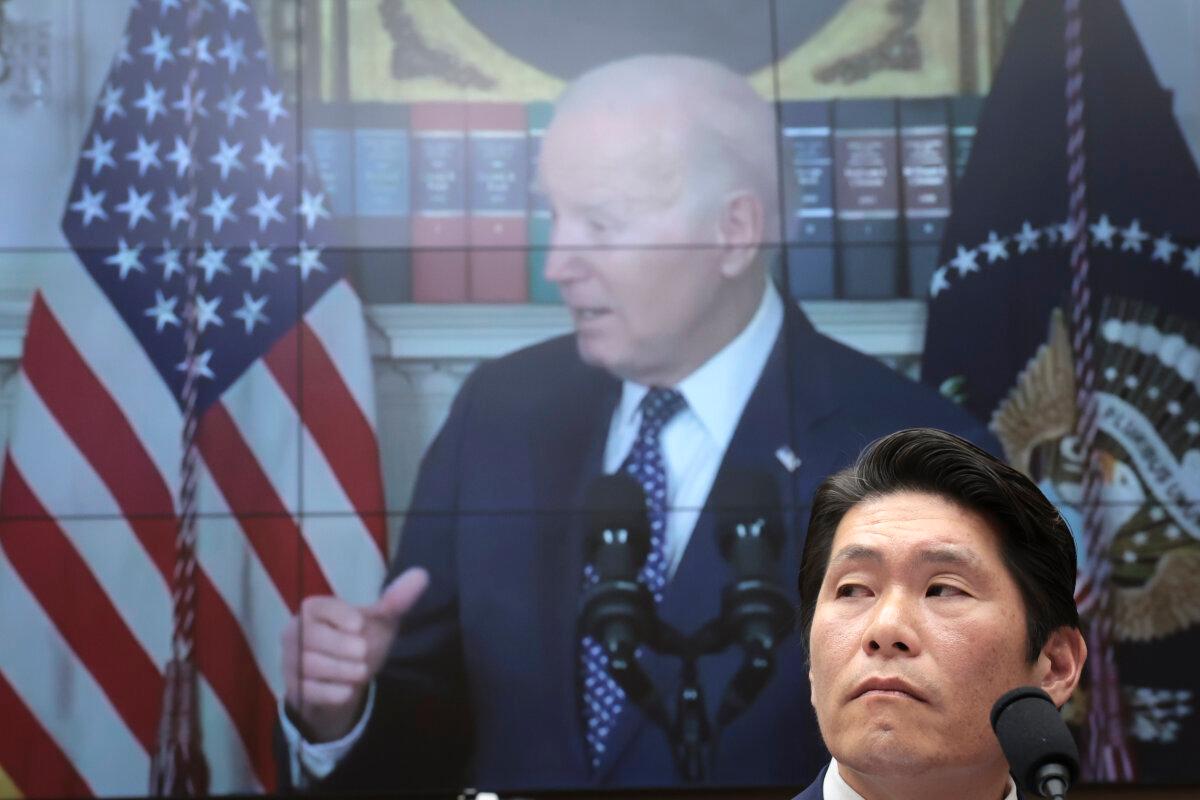
Rep. Victoria Spartz (R-Ind.) asserted in her questioning that President Joe Biden and former President Barack Obama have moved to support communism.
The lawmaker took exception to earlier comments that actions by Republicans seem to indicate a lack of awareness of communist dictators, and that President Trump has embraced tyrants from around the world.
“I grew up under communism, and I have a very good recollection of what it is,” Ms. Spartz, who grew up in the former USSR that is now Ukraine, said, going on to accuse both President Biden and President Obama of facilitating the rise in communist-like attitudes within government.
Rep. Eric Swalwell (D-Calif.) attempted to draw attention to President Trump’s mental acuity, playing a reel of the former president’s verbal missteps.
The lawmaker played a number of clips of the former president, following confirmation from Mr. Hur that at one point in his report, the special counsel said to President Biden that the president had a “photographic memory.”
All of the clips attempted to support Mr. Swalwell’s assertion that President Trump “is absolutely not photographic” in his memory.
Rep. Adam Schiff (D-Calif.) accused Mr. Hur of intentionally formulating language that would create a “political firestorm,” contradicting Mr. Hur’s previous comments that he had no intention to “disparage the president” in his report.
The California Democrat made a number of claims along the same vein, asserting that the special counsel “understood” when he included language about the president being an “elderly man with a poor memory” that it would be used by the Republican party as a political tool.
“You understood how they would be manipulated by my colleagues here on the GOP side of the aisle, by President Trump, you understood that, did you not?” Mr. Schiff asserted.
The White House has been responding to the hearing, seeking to refute the GOP talking points.
Ian Sams, the White House spokesperson for oversight and investigations, has been posting on X, formerly Twitter, in defense of President Biden.
In his first post, he tried to make the case that Mr. Hur, like President Biden, was forgetful. However, the transcript, which Mr. Sams shared a screenshot of, shows Mr. Hur saying “I may be misremembering”—as opposed to saying so definitively whereas the president, throughout the interviews, constantly expressed him not remembering things.
2 hours ago
Rep. Andy Biggs (R-Ariz.) questioned special counsel Robert Hur’s conclusion that the evidence did not support prosecuting President Joe Biden, suggesting that the report indicates he had “guilty knowledge.”
In the audio recordings between President Biden and his ghostwriter, Mr. Biggs noted that there was one exchange in which the president handed the author a page and warned him to “be careful” because some of its contents “may be classified.”
“That warning to be careful because it may be classified—that indicates guilty knowledge. That indicates he might know something more than he otherwise would have,” Mr. Biggs said.
Rep. Jeff Van Drew (R-N.J.) decried special counsel Robert Hur’s decision not to prosecute President Joe Biden as another manifestation of what he perceived to be the Justice Department’s two-tiered system of justice.
Citing Mr. Hur’s report, the congressman noted that President Biden’s conversations with his ghostwriter indicated that he was aware that he had classified materials in his possession shortly after his vice presidency.
“Sometimes he may be sleepy. Sometimes he may be forgetful. Sometimes he may be cognitively impaired, there’s no doubt about that,” Mr. Van Drew said.
Mr. Hur said firmly that “partisan politics played had no place whatsoever in my work” in response to accusations by Rep. Hank Johnson (D-Ga.) that the work in the special counsel’s report was a ploy to curry favor with President Trump.
Mr. Hur’s comments came just after he contradicted the assertion that he was a member of the Federalist Society, but confirmed that he was a “registered Republican.”
Mr. Johnson pressed further, accusing Hur of “doing everything you can do to get President Trump reelected so that you can get appointed as a federal judge, perhaps to another position in the Department of Justice.”
Rep. Matt Gaetz’s (R-Fla.) use of the term “senile” to refer to President Joe Biden did not sit well with Rep. Steve Cohen (D-Tenn.).
“That’s disrespectful of senior people with any kind of memory disability,” Mr. Cohen charged angrily in closing out his line of questioning.
“Lots of seniors have memory disability, but they’re not senile. And to [use that term] was shameful. Joe Biden is a competent, good president who knows American values.”

Rep. Matt Gaetz (R-Fla.) questioned Mr. Hur about applying a “senile cooperator theory” to the current president during his investigation “because Joe Biden cooperated and the elevator didn’t go to the top floor.”
The lawmaker questioned Mr. Hur about the differences between his report and President Biden’s public statements about not sharing classified information with his ghostwriter.
Mr. Hur confirmed that Mr. Biden’s statements were “inconsistent” with the findings in his report.

The Epoch Times team confirmed some of the findings of the special counsel’s report, issued on Feb. 8. The transcript, which is more than 250 pages long, showed that the president indeed had problems remembering key dates.
When asked about a notebook dated “4-20-09,” President Biden said, “Was I still vice president? I was, wasn’t I?”
Rep. Jamie Raskin (D-Md.), like Rep. Jerry Nadler (D-N.Y.) before him, used his time to turn the conversation back to former President Donald Trump, tearing into the 45th president for his relationship with Hungarian Prime Minister Viktor Orban.
“This, my friends, this is a memory test. But it’s not a memory test for President Biden. It’s a memory test for all of America,” Mr. Raskin said. “Do we remember fascism? Do we remember Nazism?”
Noting that President Trump hosted Mr. Orban at his Mar-a-Lago residence last week, the congressman described the Hungarian leader as an “authoritarian hustler” and “tyrant.”
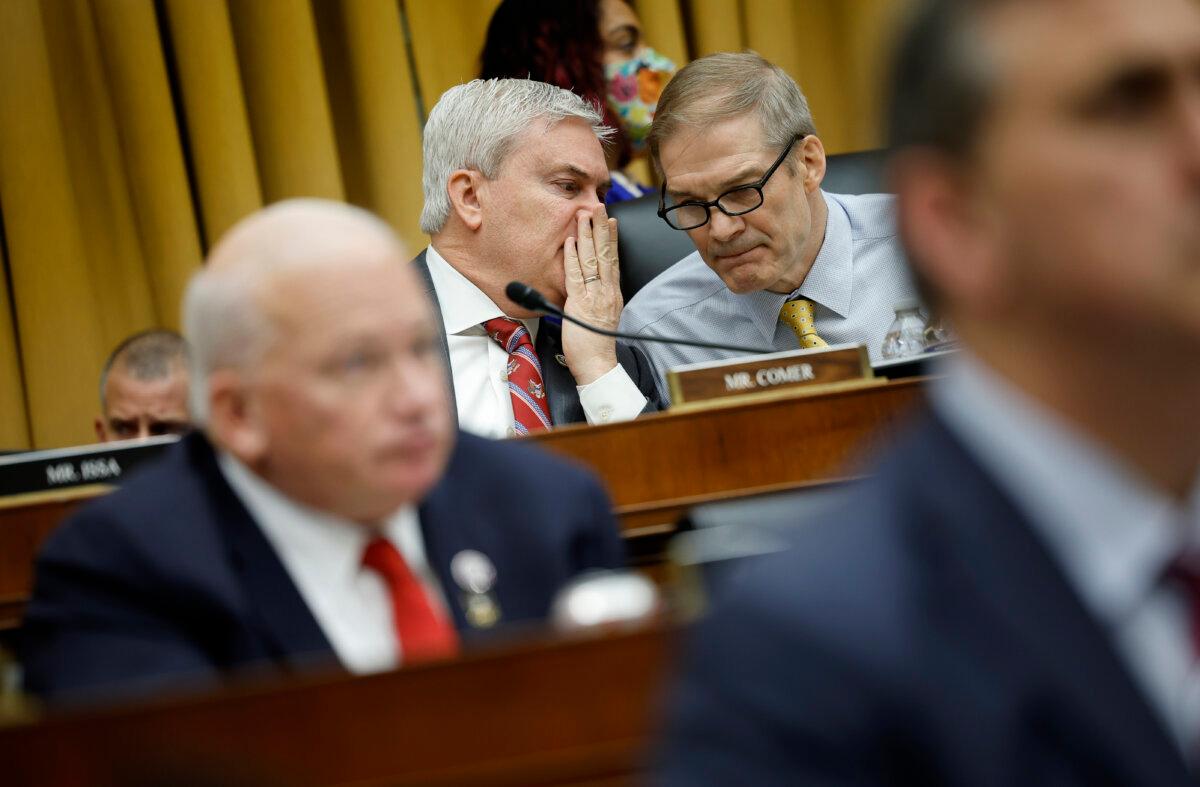
Mr. Jordan questioned Mr. Hur about the possible reasoning behind keeping classified documents at various locations, asking him what President Biden was paid for his book, which was allegedly based partially on those documents.
When pressed for an answer, Mr. Hur said President Biden was paid $8 million for his book. Following Mr. Hur’s seemingly unwilling admonition, Mr. Jordan asserted that “pride and money is why he knowingly violated the rules.”
Mr. Jordan went on to question Mr. Hur about what the ghostwriter of the book did with the information from those documents after Mr. Hur was named special counsel.
In the face of questions by Rep. McClintock (R-Calif.) about whether it is considered legally permissible to take home “secret documents” and “store them in my garage and read portions of them to friends or associates,” Mr. Hur refused to say that it was illegal, only that he “wouldn’t recommend it.”
Several similar questions were met with the same answer. When pressed further, the special counsel went on to say that, “I wouldn’t recommend it. But I don’t want to entertain any hypotheticals.”
This prompted Mr. McClintock to point to the prosecution of former President Donald Trump as a sharp juxtaposition to Mr. Hur’s recommendation that President Joe Biden not be charged.
Rep. Jerry Nadler’s (D-N.Y.) line of questioning sought to draw a contrast between the Justice Department’s separate investigations of whether President Joe Biden and former President Donald Trump mishandled classified documents.
He started by noting that President Biden’s legal team voluntarily disclosed their discovery of classified documents in his possession.
“Let’s contrast this with President Trump. Are you aware that the FBI only learned that Trump was in possession of classified material after the National Archives discovered them?” he asked Mr. Hur.
Special Counsel Robert Hur gives his opening statement to the House Judiciary Panel.
He defends commenting on the president’s memory in the report.
“The evidence and the President himself put his memory squarely at issue” as he repeatedly said he could not recall relevant facts, events, and information.

Offering opening statements, House Oversight Committee Ranking Member Rep. Jamie Raskin (D-Md.) outlined what he considered the key points from Mr. Hur’s report, emphasizing that the special counsel’s report concluded that no criminal charges were warranted against President Biden.
He also highlighted that the president cooperated with the investigation, including allowing the FBI to search his homes and participating in a voluntary interview.
Secondly, Mr. Raskin asserted that President Biden’s actions were consistent with the rule of law in what he considers a contrast to the actions of former President Donald Trump, who allegedly obstructed justice by refusing to return classified documents and attempting to destroy evidence.
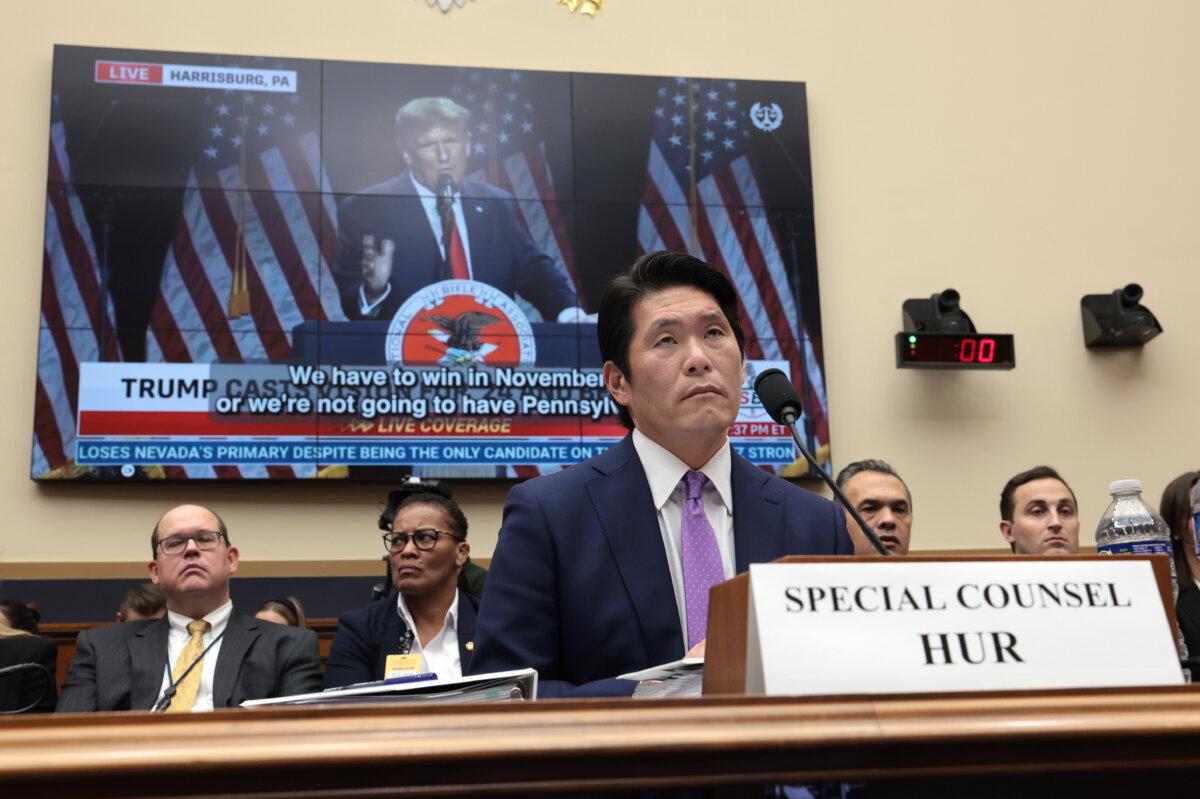
Members of the House Judiciary Committee launched their hearing of Justice Department special counsel Robert Hur’s testimony on Tuesday with contrasting displays of the memory lapses of President Joe Biden and former President Donald Trump.
Committee Chairman Jim Jordan (R-Ohio) started things off by showing footage from President Biden’s impromptu press conference following the release of Mr. Hur’s Feb. 8 report.
From the president’s heated exchanges with reporters to his mix-up of the presidents of Mexico and Egypt, the presser was widely panned as a disaster for the president that only served to heighten concerns about his mental fitness for office.
Special Counsel Robert Hur investigated the president for allegedly mishandling classified information from when he left the vice presidency in 2017. He is set to testify before the House Judiciary Committee at 10 a.m. ET.
In his report, Mr. Hur said that while the president did so, he did not do so knowingly. Classified materials were found at the Penn Biden Center and his homes in Delaware. Some were tied to the war in Afghanistan and others were for his two memoirs that were ghostwritten by Mark Zwonitzer.
In his opening testimony, obtained by The Epoch Times, Mr. Hur is expected to say that he conducted a “thorough investigation.”

Department of Justice (DOJ) special counsel Robert Hur will defend his decisions surrounding his probe of whether President Joe Biden mishandled classified information before the House Judiciary Committee on March 12—including his comments on the president’s memory.
During the hearing, Mr. Hur is expected to defend both of those moves.
Original News Source Link – Epoch Times
Running For Office? Conservative Campaign Consulting – Election Day Strategies!
